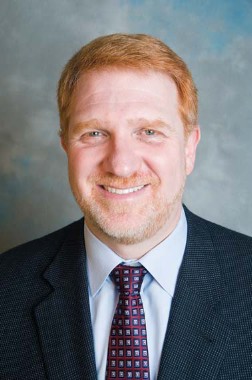User login
The Colon Section of the 2013 AGA Spring Post Graduate Course reviewed the state of the art for the management of Clostridium difficile infection, as well as several hot topics in colonoscopy and colorectal cancer screening. Dr. Ciaran Kelly started off the session with a talk entitled "Not Your Grandmother’s C. Diff Infection," describing the recent increases in the incidence, morbidity, and mortality of C. difficile infection as well as improvements in diagnostic testing and treatment approaches. The latest studies regarding new antibiotics (e.g. fidaxomicin) and fecal microbiota transplantation were reviewed.
The session’s other speakers focused on colorectal cancer screening and colonoscopy. Dr. Douglas Robertson described the currently recommended screening strategies, including annual high-sensitivity fecal occult blood testing (FOBT), sigmoidoscopy, and colonoscopy, as well as CT colonoscopy and fecal DNA tests and serology. In addition to a thorough review of the available screening tests, he also examined the overall approach to screening and encouraged the audience to consider tailored approaches based upon risk, and those that consider patient preference.
Dr. Brooks Cash provided strategies to optimize bowel preparation quality, given the importance of bowel preparation with respect to identification of colonic neoplasia. Keys to achieving a clean colon include patient education, as well as appropriate timing of the preparation. Studies have demonstrated that the time since last ingestion of the prep is strongly associated with quality, resulting in a recommendation for split-dosing and a goal of beginning colonoscopy within 8 hours of completing the prep.
Now that the patient has a clean colon, Dr. Douglas Rex reviewed the latest approaches for removing polyps. With the recent focus on improving colonoscopy quality in light of studies demonstrating a higher than anticipated risk of cancer after colonoscopy, researchers are now investigating the best way to assure complete resection of polyps. Dr. Rex provided practical tips, such as when to use snares versus cold biopsy forceps and how to use submucosal injection of a contrast agent to highlight the edges of subtle polyps.
When patients are found to have a polyposis syndrome, many questions arise about management of that individual, as well as their family members. Dr. Carol Burke provided a detailed discussion on how to recognize and manage a variety of hereditary colorectal cancer syndromes, including familial adenomatous polyposis (FAP) and MYH-Associated Polyposis (MAP).
Given that colorectal cancer is the second leading cause of cancer death in the United States, these talks provided practical and crucial advice on how to screen for colorectal cancer, and when that screening is done with colonoscopy, how best to assure a high quality exam.
Dr. Dominitz is a professor and the National Program Director for Gastroenterology in the Department of Veterans Affairs, co-chair of VA CSP CONFIRM, and Acting GI Section Chief of the VA Puget Sound Health Care System, Seattle.
The Colon Section of the 2013 AGA Spring Post Graduate Course reviewed the state of the art for the management of Clostridium difficile infection, as well as several hot topics in colonoscopy and colorectal cancer screening. Dr. Ciaran Kelly started off the session with a talk entitled "Not Your Grandmother’s C. Diff Infection," describing the recent increases in the incidence, morbidity, and mortality of C. difficile infection as well as improvements in diagnostic testing and treatment approaches. The latest studies regarding new antibiotics (e.g. fidaxomicin) and fecal microbiota transplantation were reviewed.
The session’s other speakers focused on colorectal cancer screening and colonoscopy. Dr. Douglas Robertson described the currently recommended screening strategies, including annual high-sensitivity fecal occult blood testing (FOBT), sigmoidoscopy, and colonoscopy, as well as CT colonoscopy and fecal DNA tests and serology. In addition to a thorough review of the available screening tests, he also examined the overall approach to screening and encouraged the audience to consider tailored approaches based upon risk, and those that consider patient preference.
Dr. Brooks Cash provided strategies to optimize bowel preparation quality, given the importance of bowel preparation with respect to identification of colonic neoplasia. Keys to achieving a clean colon include patient education, as well as appropriate timing of the preparation. Studies have demonstrated that the time since last ingestion of the prep is strongly associated with quality, resulting in a recommendation for split-dosing and a goal of beginning colonoscopy within 8 hours of completing the prep.
Now that the patient has a clean colon, Dr. Douglas Rex reviewed the latest approaches for removing polyps. With the recent focus on improving colonoscopy quality in light of studies demonstrating a higher than anticipated risk of cancer after colonoscopy, researchers are now investigating the best way to assure complete resection of polyps. Dr. Rex provided practical tips, such as when to use snares versus cold biopsy forceps and how to use submucosal injection of a contrast agent to highlight the edges of subtle polyps.
When patients are found to have a polyposis syndrome, many questions arise about management of that individual, as well as their family members. Dr. Carol Burke provided a detailed discussion on how to recognize and manage a variety of hereditary colorectal cancer syndromes, including familial adenomatous polyposis (FAP) and MYH-Associated Polyposis (MAP).
Given that colorectal cancer is the second leading cause of cancer death in the United States, these talks provided practical and crucial advice on how to screen for colorectal cancer, and when that screening is done with colonoscopy, how best to assure a high quality exam.
Dr. Dominitz is a professor and the National Program Director for Gastroenterology in the Department of Veterans Affairs, co-chair of VA CSP CONFIRM, and Acting GI Section Chief of the VA Puget Sound Health Care System, Seattle.
The Colon Section of the 2013 AGA Spring Post Graduate Course reviewed the state of the art for the management of Clostridium difficile infection, as well as several hot topics in colonoscopy and colorectal cancer screening. Dr. Ciaran Kelly started off the session with a talk entitled "Not Your Grandmother’s C. Diff Infection," describing the recent increases in the incidence, morbidity, and mortality of C. difficile infection as well as improvements in diagnostic testing and treatment approaches. The latest studies regarding new antibiotics (e.g. fidaxomicin) and fecal microbiota transplantation were reviewed.
The session’s other speakers focused on colorectal cancer screening and colonoscopy. Dr. Douglas Robertson described the currently recommended screening strategies, including annual high-sensitivity fecal occult blood testing (FOBT), sigmoidoscopy, and colonoscopy, as well as CT colonoscopy and fecal DNA tests and serology. In addition to a thorough review of the available screening tests, he also examined the overall approach to screening and encouraged the audience to consider tailored approaches based upon risk, and those that consider patient preference.
Dr. Brooks Cash provided strategies to optimize bowel preparation quality, given the importance of bowel preparation with respect to identification of colonic neoplasia. Keys to achieving a clean colon include patient education, as well as appropriate timing of the preparation. Studies have demonstrated that the time since last ingestion of the prep is strongly associated with quality, resulting in a recommendation for split-dosing and a goal of beginning colonoscopy within 8 hours of completing the prep.
Now that the patient has a clean colon, Dr. Douglas Rex reviewed the latest approaches for removing polyps. With the recent focus on improving colonoscopy quality in light of studies demonstrating a higher than anticipated risk of cancer after colonoscopy, researchers are now investigating the best way to assure complete resection of polyps. Dr. Rex provided practical tips, such as when to use snares versus cold biopsy forceps and how to use submucosal injection of a contrast agent to highlight the edges of subtle polyps.
When patients are found to have a polyposis syndrome, many questions arise about management of that individual, as well as their family members. Dr. Carol Burke provided a detailed discussion on how to recognize and manage a variety of hereditary colorectal cancer syndromes, including familial adenomatous polyposis (FAP) and MYH-Associated Polyposis (MAP).
Given that colorectal cancer is the second leading cause of cancer death in the United States, these talks provided practical and crucial advice on how to screen for colorectal cancer, and when that screening is done with colonoscopy, how best to assure a high quality exam.
Dr. Dominitz is a professor and the National Program Director for Gastroenterology in the Department of Veterans Affairs, co-chair of VA CSP CONFIRM, and Acting GI Section Chief of the VA Puget Sound Health Care System, Seattle.

